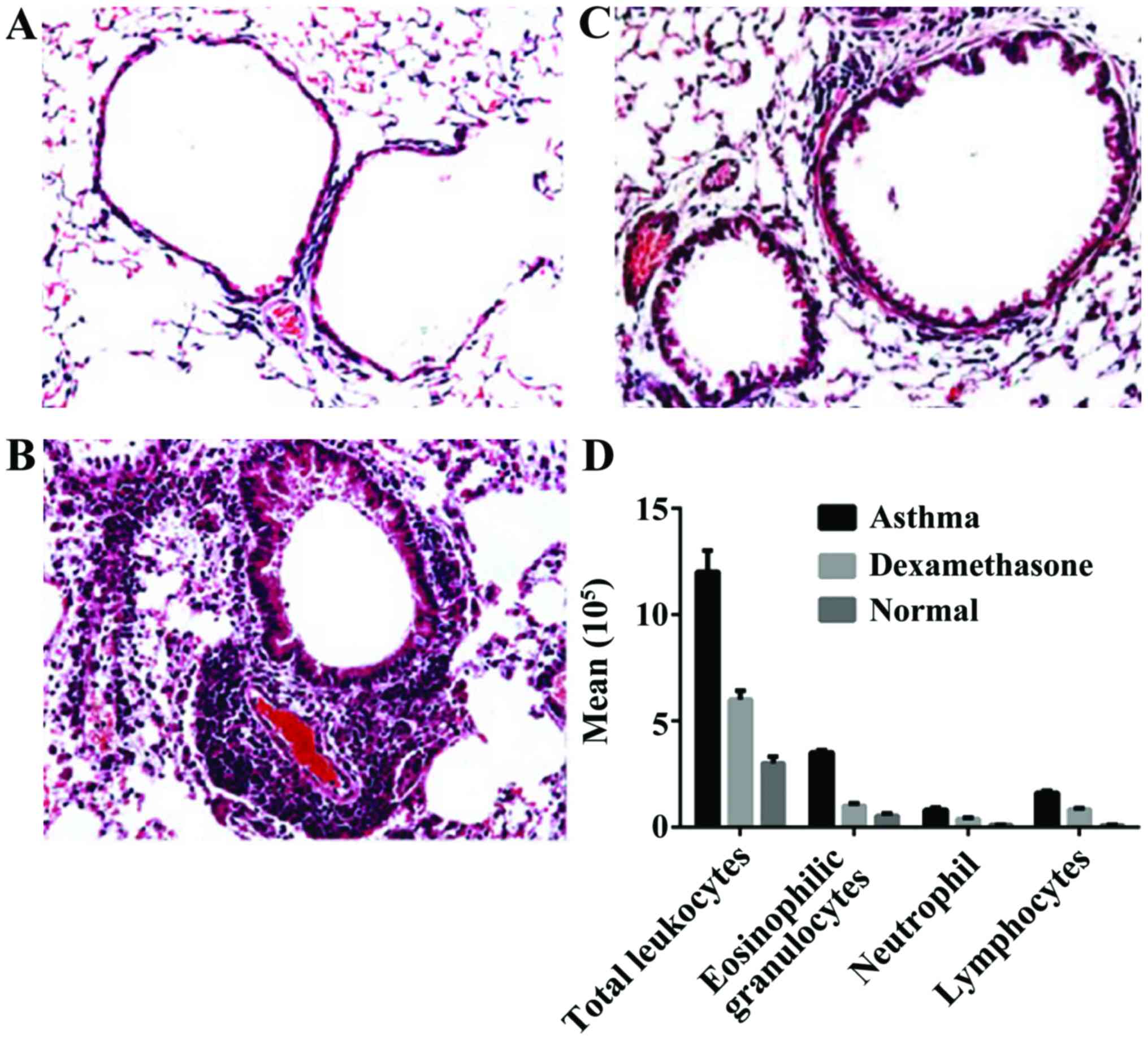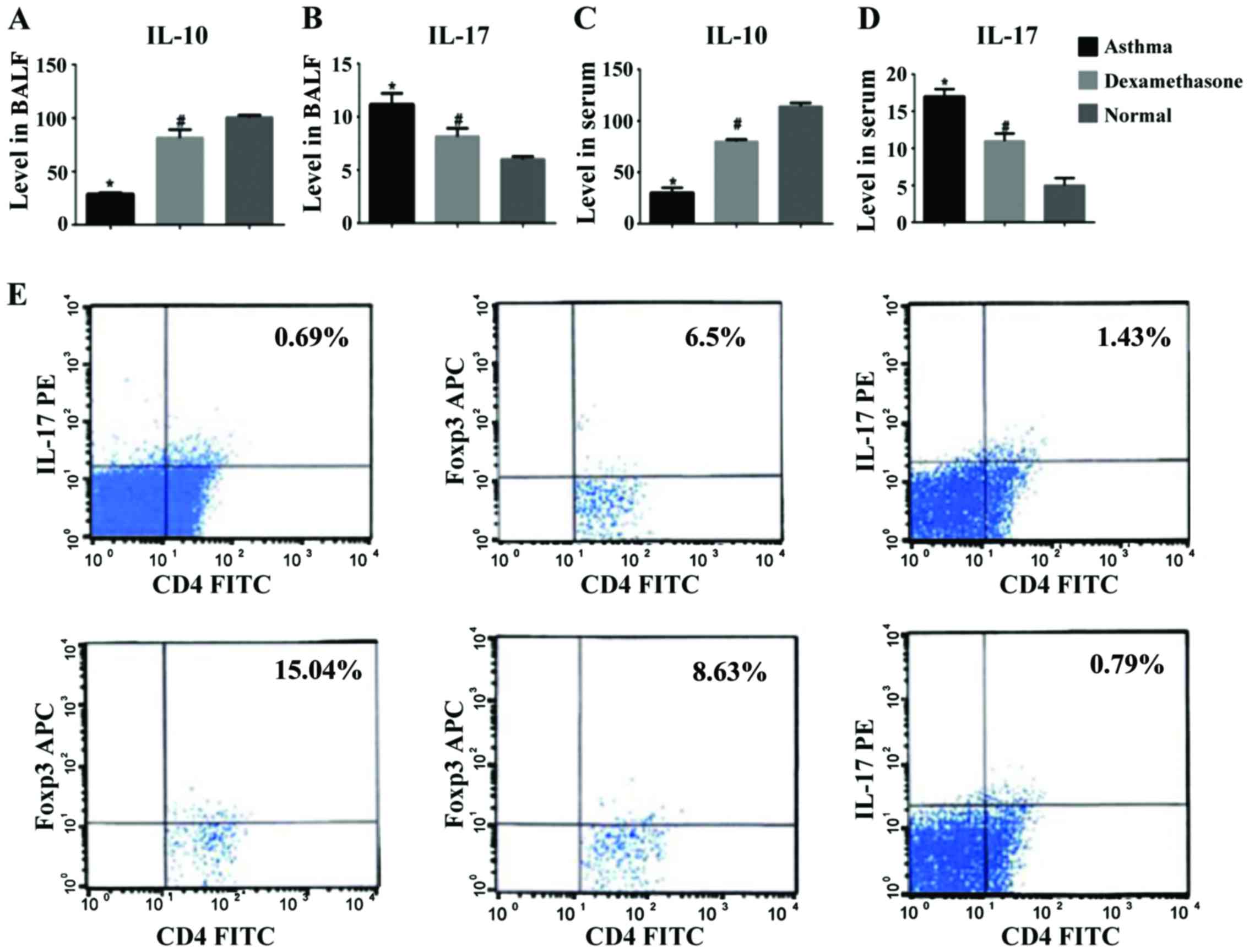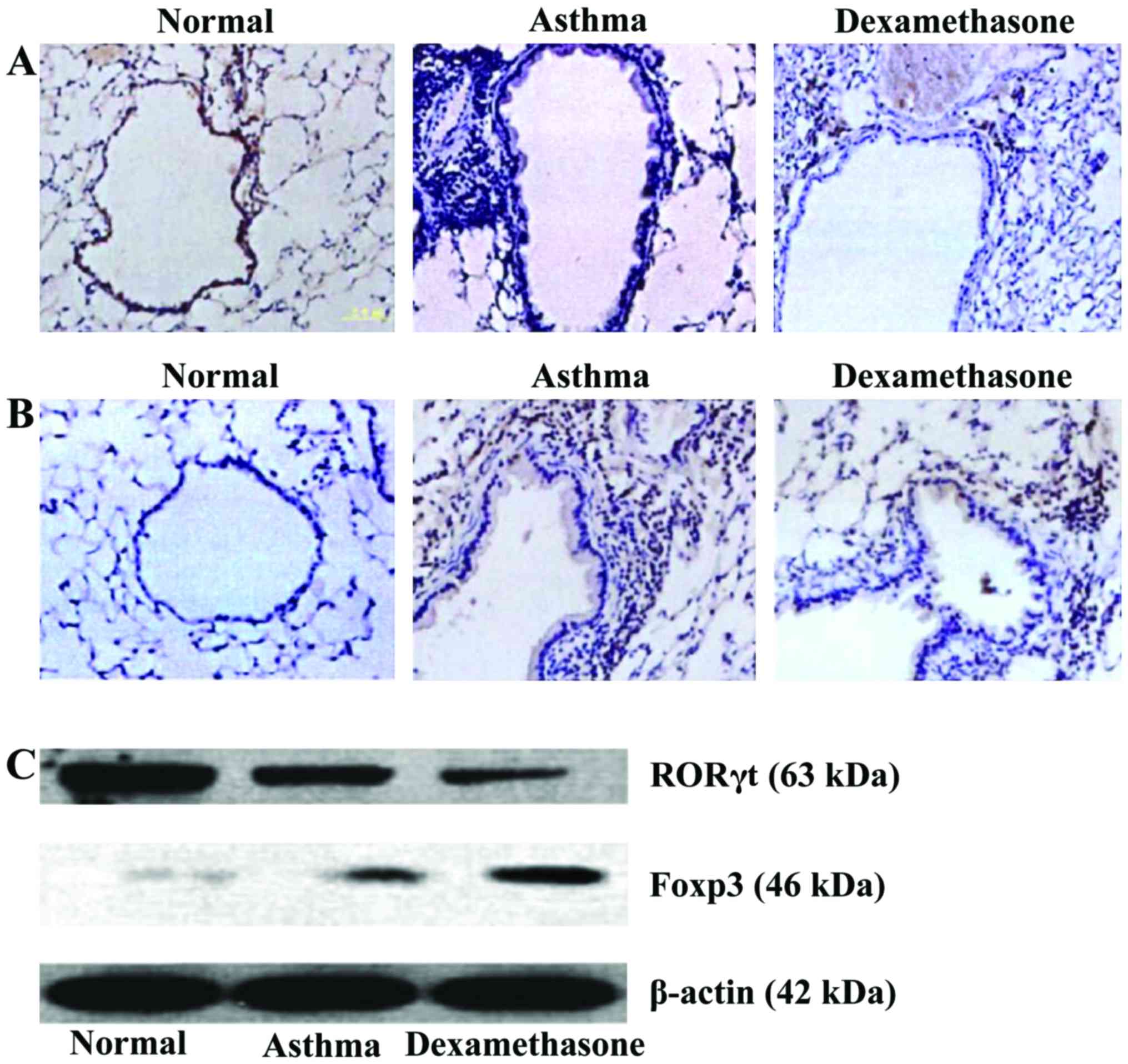|
1
|
Barnes PJ: Therapeutic approaches to
asthma-chronic obstructive pulmonary disease overlap syndromes. J
Allergy Clin Immunol. 136:531–545. 2015. View Article : Google Scholar : PubMed/NCBI
|
|
2
|
Postma DS, Weiss ST, van den Berge M,
Kerstjens HA and Koppelman GH: Revisiting the Dutch hypothesis. J
Allergy Clin Immunol. 136:521–529. 2015. View Article : Google Scholar : PubMed/NCBI
|
|
3
|
Busse W, Banks-Schlegel S, Noel P, Ortega
H, Taggart V and Elias J; NHLBI Working Group, : Future research
directions in asthma: An NHLBI Working Group report. Am J Respir
Crit Care Med. 170:683–690. 2004. View Article : Google Scholar : PubMed/NCBI
|
|
4
|
Gauthier M, Ray A and Wenzel SE: Evolving
concepts of asthma. Am J Respir Crit Care Med. 192:660–668. 2015.
View Article : Google Scholar : PubMed/NCBI
|
|
5
|
Raedler D, Ballenberger N, Klucker E, Böck
A, Otto R, da Costa O Prazeres, Holst O, Illig T, Buch T, von
Mutius E, et al: Identification of novel immune phenotypes for
allergic and nonallergic childhood asthma. J Allergy Clin Immunol.
135:81–91. 2015. View Article : Google Scholar : PubMed/NCBI
|
|
6
|
Ramstein J, Broos CE, Simpson LJ, Ansel
KM, Sun SA, Ho ME, Woodruff PG, Bhakta NR, Christian L, Nguyen CP,
et al: IFN-γ-producing T-helper 17.1 cells are increased in
sarcoidosis and are more prevalent than T-helper type 1 cells. Am J
Respir Crit Care Med. 193:1281–1291. 2016. View Article : Google Scholar : PubMed/NCBI
|
|
7
|
Park SY, Jing X, Gupta D and Dziarski R:
Peptidoglycan recognition protein 1 enhances experimental asthma by
promoting Th2 and Th17 and limiting regulatory T cell and
plasmacytoid dendritic cell responses. J Immunol. 190:3480–3492.
2013. View Article : Google Scholar : PubMed/NCBI
|
|
8
|
Shum AK: T cell types that take your
breath away. Sci Transl Med. 7:301fs332015. View Article : Google Scholar : PubMed/NCBI
|
|
9
|
Hinks T, Zhou X, Staples K, Dimitrov B,
Manta A, Petrossian T, Lum P, Smith C, Ward J, Howarth P, et al:
Multidimensional endotypes of asthma: Topological data analysis of
cross-sectional clinical, pathological, and immunological data.
Lancet. 385 Suppl 1:S422015. View Article : Google Scholar : PubMed/NCBI
|
|
10
|
Keely S and Foster PS: Stop press:
Eosinophils drafted to join the th17 team. Immunity. 43:7–9. 2015.
View Article : Google Scholar : PubMed/NCBI
|
|
11
|
Hinks TS, Zhou X, Staples KJ, Dimitrov BD,
Manta A, Petrossian T, Lum PY, Smith CG, Ward JA, Howarth PH, et
al: Innate and adaptive T cells in asthmatic patients: Relationship
to severity and disease mechanisms. J Allergy Clin Immunol.
136:323–333. 2015. View Article : Google Scholar : PubMed/NCBI
|
|
12
|
Chesné J, Braza F, Chadeuf G, Mahay G,
Cheminant MA, Loy J, Brouard S, Sauzeau V, Loirand G and Magnan A:
Prime role of IL-17A in neutrophilia and airway smooth muscle
contraction in a house dust mite-induced allergic asthma model. J
Allergy Clin Immunol. 135:1643–1643.e3. 2015. View Article : Google Scholar : PubMed/NCBI
|
|
13
|
Tao B, Ruan G, Wang D, Li Y, Wang Z and
Yin G: Imbalance of peripheral th17 and regulatory t cells in
children with allergic rhinitis and bronchial asthma. Iran J
Allergy Asthma Immunol. 14:273–279. 2015.PubMed/NCBI
|
|
14
|
El-Zein M, Conus F, Benedetti A, Parent ME
and Rousseau MC: Evaluating the validity of a two-stage sample in a
birth cohort established from administrative databases.
Epidemiology. 27:105–115. 2016. View Article : Google Scholar : PubMed/NCBI
|
|
15
|
Son HL, Park HR, Park YJ and Kim SW:
Effect of retinoic acid in a mouse model of allergic rhinitis.
Allergy Asthma Immunol Res. 7:590–598. 2015. View Article : Google Scholar : PubMed/NCBI
|
|
16
|
Jacquet A: Innate immune responses in
house dust mite allergy. ISRN Allergy. 2013:7350312013. View Article : Google Scholar : PubMed/NCBI
|
|
17
|
Everaere L, Ait-Yahia S, Molendi-Coste O,
Vorng H, Quemener S, LeVu P, Fleury S, Bouchaert E, Fan Y, Duez C,
et al: Innate lymphoid cells contribute to allergic airway disease
exacerbation by obesity. J Allergy Clin Immunol. 138:1309–1318.e11.
2016. View Article : Google Scholar : PubMed/NCBI
|
|
18
|
Houghton LA, Lee AS, Badri H, DeVault KR
and Smith JA: Respiratory disease and the oesophagus: Reflux,
reflexes and microaspiration. Nat Rev Gastroenterol Hepatol.
13:445–460. 2016. View Article : Google Scholar : PubMed/NCBI
|
|
19
|
Kinoshita T, Baatjes A, Smith SG, Dua B,
Watson R, Kawayama T, Larche M, Gauvreau GM and O'Byrne PM: Natural
regulatory T cells in isolated early responders compared with dual
responders with allergic asthma. J Allergy Clin Immunol.
133:696–703. 2014. View Article : Google Scholar : PubMed/NCBI
|
|
20
|
Lluis A, Depner M, Gaugler B, Saas P,
Casaca VI, Raedler D, Michel S, Tost J, Liu J, Genuneit J, et al
Protection Against Allergy, : Study in Rural Environments Study
Group: Increased regulatory T-cell numbers are associated with farm
milk exposure and lower atopic sensitization and asthma in
childhood. J Allergy Clin Immunol. 133:551–559. 2014. View Article : Google Scholar : PubMed/NCBI
|
|
21
|
Frischmeyer-Guerrerio PA, Guerrerio AL,
Oswald G, Chichester K, Myers L, Halushka MK, Oliva-Hemker M, Wood
RA and Dietz HC: TGFβ receptor mutations impose a strong
predisposition for human allergic disease. Sci Transl Med.
5:195ra942013. View Article : Google Scholar : PubMed/NCBI
|
|
22
|
Brandt EB, Kovacic MB, Lee GB, Gibson AM,
Acciani TH, Le Cras TD, Ryan PH, Budelsky AL and Hershey GK
Khurana: Diesel exhaust particle induction of IL-17A contributes to
severe asthma. J Allergy Clin Immunol. 132:1194–1204.e2. 2013.
View Article : Google Scholar : PubMed/NCBI
|
|
23
|
Roychoudhuri R, Hirahara K, Mousavi K,
Clever D, Klebanoff CA, Bonelli M, Sciumè G, Zare H, Vahedi G, Dema
B, et al: BACH2 represses effector programs to stabilize
T(reg)-mediated immune homeostasis. Nature. 498:506–510. 2013.
View Article : Google Scholar : PubMed/NCBI
|
|
24
|
Massoud AH, Charbonnier LM, Lopez D,
Pellegrini M, Phipatanakul W and Chatila TA: An asthma-associated
IL4R variant exacerbates airway inflammation by promoting
conversion of regulatory T cells to TH17-like cells. Nat Med.
22:1013–1022. 2016. View Article : Google Scholar : PubMed/NCBI
|
|
25
|
Han RF, Li HY, Wang JW and Cong XJ: Study
on clinical effect and immunologic mechanism of infants capillary
bronchitis secondary bronchial asthma treated with bacterial
lysates Broncho-Vaxom. Eur Rev Med Pharmacol Sci. 20:2151–2155.
2016.PubMed/NCBI
|
|
26
|
Finotto S: T-cell regulation in asthmatic
diseases. Chem Immunol Allergy. 94:83–92. 2008. View Article : Google Scholar : PubMed/NCBI
|

















